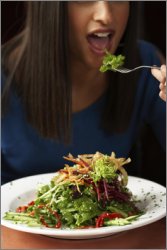|
|

|

Six Foods That Can Help You Fight Menstrual Stress
by www.SixWise.com It's estimated that three out of every four menstruating
women experience some form of menstrual stress, such as premenstrual
syndrome (PMS) or menstrual cramps.
|

Estimates of exactly how many menstruating women get
PMS vary widely, but some go as high as 80 percent!
|
What causes PMS and cramps? Because the changes that happen
during PMS coincide with changes in hormone levels during
the menstrual cycle, the most widespread theory about PMS
is that it's related to changes in female sex hormones like
estrogen and progesterone (though how it's related isn't clear).
Other theories have been suggested including that PMS could:
-
Be related to hypoglycemia (abnormally low blood sugar
levels) or hypothyroidism (abnormally low levels of thyroid
hormones).
-
Be related to pituitary hormones, prostaglandins and
neurotransmitters in the brain.
-
Be due to a diet lacking in B vitamins, calcium or magnesium.
If there were to be a consensus among experts, however, it's
likely to be that PMS is due to a variety of factors, including
the physiological ones listed above, but also because of genetics,
environment and lifestyle factors like nutrition and stress.
Menstrual cramps, meanwhile, may be caused by prostaglandins,
which are hormone-like substances involved in pain and inflammation
that trigger your uterus to contract to expel its lining.
Though the symptoms of menstrual stress, which can range
from upset stomach and muscle pain to food cravings, depression
and trouble concentrating, can feel inescapable, the following
foods may help to soothe both your mind and body before and
during menstruation.
-
Dairy foods. A study published in the Archives
of Internal Medicine found that women who ate four servings
or more a day of a dairy product were less likely to develop
PMS symptoms including anxiety, loneliness, irritability,
tearfulness and tension.
-
Raw pumpkin seeds. Pumpkin seeds are rich in
magnesium, which has been found to help reduce fluid retention,
breast tenderness and bloating caused by PMS.
|

Eating plenty of fruits and veggies is an excellent
way to boost your body's nutrient levels and keep PMS
symptoms to a minimum.
|
-
Chicken. Chicken is a great source of vitamin
B6, which may help to relieve some symptoms of PMS, according
to the Mayo Clinic.
-
Almonds. Almonds are rich in vitamin E, which
helps to reduce the production of prostaglandins that
may contribute to cramps and breast tenderness.
-
Leafy greens. Green vegetables like spinach,
collard greens, turnip greens and mustard greens are loaded
with calcium, which has been found to reduce both the
physical and mental symptoms of PMS.
-
Consider a multivitamin. Because some symptoms
of PMS have been linked to low levels of nutrients, you
may want to take a multivitamin. We highly recommend the
Ultravite
PMS Formula for this purpose. It's an all-natural
multi-mineral and vitamin supplement, specifically formulated
to relieve and prevent the symptoms of PMS. It's rich
in calcium, vitamin D, magnesium, B vitamins, vitamin
E and much, much more.
Recommended Reading
Want
to Reduce PMS? Eat Some Cheese, Get Some Sun and Take These
Other Steps
PMS:
The Latest Insights
Sources
The
World's Healthiest Foods
The
Mayo Clinic
To get more information about this and other highly important topics, sign up for your free subscription to our weekly SixWise.com "Be Safe, Live Long & Prosper" e-newsletter.
With every issue of the free SixWise.com newsletter, you’ll get access to the insights, products, services, and more that can truly improve your well-being, peace of mind, and therefore your life!
|
|
|
|